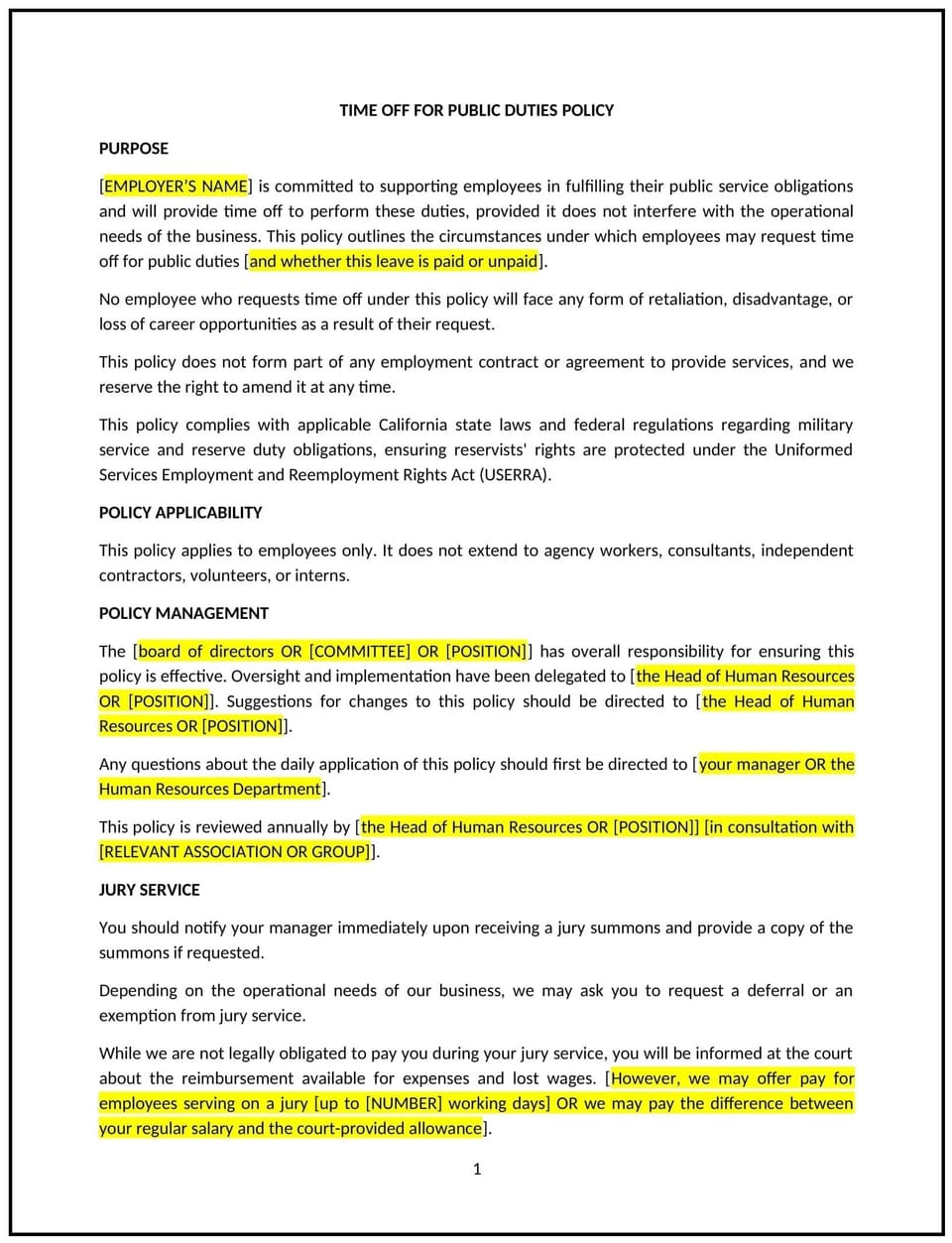Time off for public duties policy (California): Free template

Time off for public duties policy (California)
In California, a time off for public duties policy provides businesses with guidelines for granting employees leave to perform civic responsibilities, such as serving on a jury, attending court as a witness, or engaging in other legally recognized public duties. This policy supports compliance with California labor laws, including the California Labor Code, which protects employees from retaliation for taking time off for public service.
This policy outlines eligibility, procedures for requesting time off, and expectations for employees and the business during the leave period. By implementing this policy, California businesses can demonstrate civic responsibility while ensuring compliance with legal obligations.
How to use this time off for public duties policy (California)
- Define covered activities: Specify the types of public duties eligible for leave under California law, such as jury duty, voting, or serving as a witness in court.
- Communicate employee rights: Ensure employees understand their legal protections for taking time off to fulfill public duties.
- Outline request procedures: Provide clear steps for employees to request time off, including advance notice and documentation requirements.
- Address pay and benefits: Clarify whether time off is paid or unpaid and how benefits will be maintained during the leave period, in compliance with California laws.
- Ensure non-retaliation: Emphasize that employees will not face retaliation or adverse actions for taking time off for public duties.
Benefits of using this time off for public duties policy (California)
This policy offers several advantages for California businesses:
- Supports compliance: Reflects California labor laws protecting employees’ rights to take time off for public duties.
- Promotes fairness: Provides consistent guidelines for managing public duty leave across the organization.
- Reduces risks: Minimizes potential legal disputes by ensuring employees are treated equitably when fulfilling public duties.
- Demonstrates civic responsibility: Reinforces the business’s commitment to supporting employees in serving their communities.
- Maintains trust: Builds positive relationships with employees by respecting their legal rights.
Tips for using this time off for public duties policy (California)
- Reflect California-specific laws: Ensure compliance with Labor Code provisions protecting employees engaged in public duties.
- Communicate clearly: Share the policy with employees during onboarding and provide reminders about their rights as needed.
- Require documentation: Request official documentation, such as jury summons or court notices, to confirm eligibility for leave.
- Monitor compliance: Train managers to handle public duty leave requests consistently and lawfully.
- Review regularly: Update the policy to reflect changes in California laws or workplace practices.
Q: How does this policy benefit the business?
A: This policy supports compliance with California labor laws, ensures fair treatment of employees, and fosters a positive work environment.
Q: What types of public duties are covered under this policy?
A: Eligible duties include jury service, acting as a court witness, voting, or fulfilling other civic responsibilities recognized by California law.
Q: How does this policy support compliance with California laws?
A: The policy aligns with California labor laws, protecting employees from retaliation and ensuring their right to take time off for public duties.
Q: What steps should employees take to request time off for public duties?
A: Employees should provide advance notice to their manager or HR, along with supporting documentation, such as a jury summons or subpoena.
Q: How can the business manage workloads during an employee’s leave for public duties?
A: The business can reassign tasks, adjust schedules, or hire temporary staff to maintain productivity during the employee’s absence.
This article contains general legal information and does not contain legal advice. Cobrief is not a law firm or a substitute for an attorney or law firm. The law is complex and changes often. For legal advice, please ask a lawyer.


